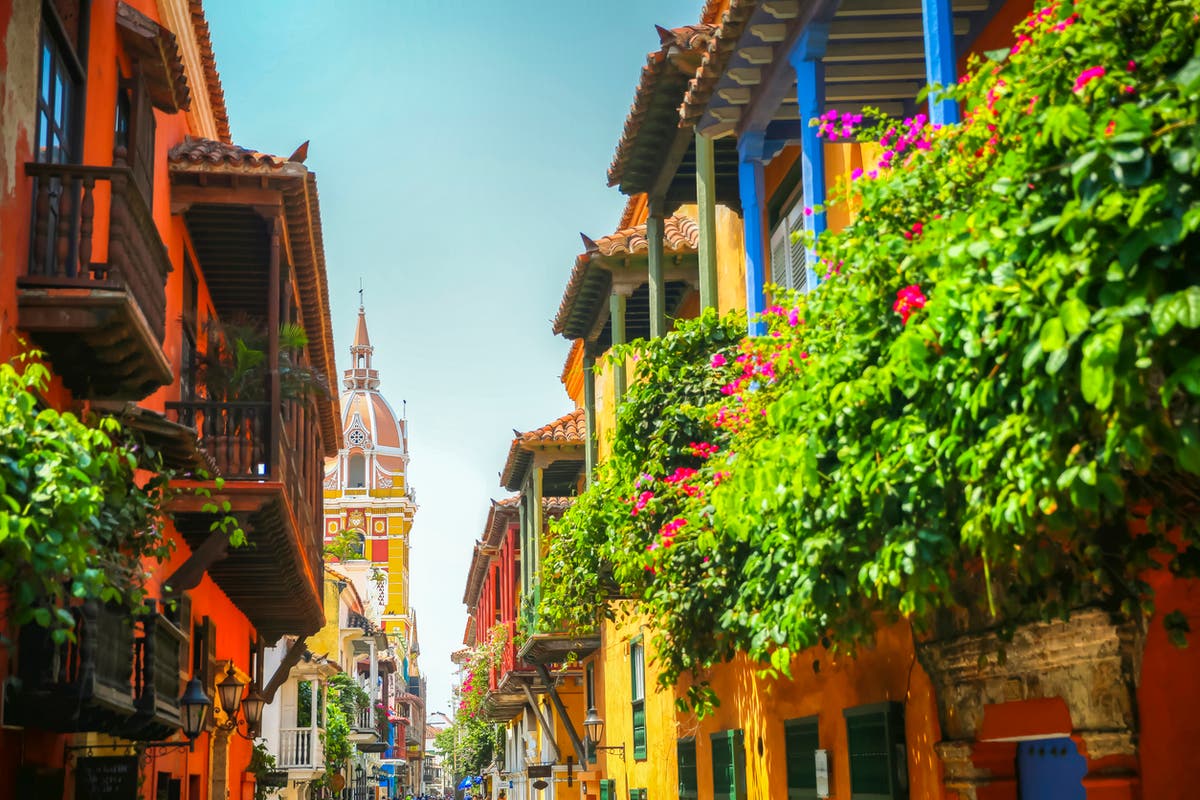7 of the best countries to visit in South America
This continent contains some of the world’s most amazing natural landscapes, enchanting cities and a fascinating history


Sign up to Simon Calder’s free travel email for expert advice and money-saving discounts
Get Simon Calder’s Travel email
From the towering Andes mountains and the vast Amazon rainforest to the alluring lakes of Patagonia, South America has gained a reputation as an enthralling place to visit.
Such is the continent’s wealth of natural sites that almost every country is blessed with landmarks that are not only incredible but also totally unique. It is a land of superlatives, where each country contains something in the ‘world’s most’ category, from the Uyuni salt flats in Bolivia to Chile’s Atacama desert.
Add to this a slew of enchanting cities, from the European charm of Buenos Aires to the infectious atmosphere of Rio de Janeiro and the buzz of Medellín, and you can begin to see why this continent appeals to a broad range of holidaymaker.
But with so much to see and do, it’s hard to know which region to explore first. To give you somewhere to start, we’ve rounded up a list of the best countries for travellers in 2024.
Argentina
Argentina is the eighth-largest country in the world
(Getty Images)
Argentina may initially appear difficult to explore due to its size, but it offers a spellbinding array of towns, cities and natural regions to explore.
Buenos Aires is a sensible starting point. Known as the ‘Paris of South America’, it is a lively mix of beautiful 19th-century buildings in tango-fuelled barrios and football. It is also the jumping-off point for journeys to places like the incredible Iguazu Falls and cities including Cordoba and Rosario.
Almost directly west of the capital, not too far from the border with Chile, lies Mendoza, perhaps the continent’s most famous wine-producing region. Surrounded by the Andes mountain range and a series of flat plains and vineyards, this region is delightfully picturesque and a must-visit for lovers of malbec.
That Mendoza is not Argentina’s most scenic region is testament to the natural beauty of the Argentinian section of Patagonia. Towns such as San Martin de los Andes, Villa la Angostura and Ushuaia sit on glacial lakes surrounded by snowcapped volcanoes, with the potential for outdoor activities feels almost limitless. For one of South America’s bucket-list experiences, try driving the Ruta 40, a 3,246-mile road that runs from Patagonia all the way up the country.
Read more on South America travel:
Bolivia
Bolivia is named after Venezuelan independence fighter Simon Bolivar, whose support helped liberate the territory
(Getty Images)
Bolivia’s combination of sought-after sights and slightly less tourism infrastructure makes for a compelling experience that feels rather more off-the-beaten track.
At 3,650 metres above sea level, La Paz is the highest capital city in the world. With its dramatic mountain setting, strong indigenous influence and hectic way of life, it is at odds with Sucre, the constitutional capital of the country, which is a charming sea of white-washed, russet-roofed colonial buildings that has opened up slightly more to outside influence. Visit both to get a real sense of Bolivian day-to-day life.
Near the capital, the Andes meet the Amazon basin in the Yungas region, where towns like Coroico and Chulumani acts as springboards for exploring other parts of the rainforest. Close to the border with Peru lies Lake Titicaca, the largest in South America and a popular place for hiking and climbing. Equally as magnificent but far more isolated are the Salar de Uyuni salt flats, the largest in the world.
Brazil
Brazil is home to almost half of the entire population of South America
(Getty Images)
By far the largest country on the continent, Brazil is a place that has written itself into travel folklore thanks to a combination of famous landmarks, astonishing natural sites and an eclectic variety of towns and cities.
Rio de Janeiro has established itself as the face of tourism in Brazil, helped by the beauty of its beaches, the grandeur of its main attractions and the fame of its Carnival celebrations. Cities like São Paulo and Salvador are catching up, aided by a fascinating history and remarkable areas of their own, while other places throughout Brazil – such as Ouro Preto and Florianopolis – are slowly gaining the attention they deserve.
But while the country’s cities are often captivating, it is in nature that you can see many of Brazil’s most mesmerising aspects. A large section of the Amazon river is found here, with the city of Manaus providing a base for river cruises and jungle expeditions. These waters, and the surrounding rainforest, are one of the world’s most fascinating ecosystems, home to over three million plant and animal species.
And while a section of the aforementioned Iguazu Falls lies in Argentina, the vast majority – and the best section for cruising among the 275 waterfalls – lies in Brazil, near the town of Foz do Iguaçu.
Colombia
Colombia is among the top three most biodiverse countries in the world, alongside Brazil and Indonesia
(Getty Images/iStockphoto)
Although Colombia suffered extensive damage to both its society and international reputation during the era of Escobar, the country has bounced back remarkably well. Today, it is a place that appeals to an array of tourists, from backpacking youngsters and intrepid adventurers to families looking for a beach break.
The majority of the population lives on the western side of the Andes (which themselves offer hiking opportunities and the chance to see the ‘Liquid Rainbow’ in the Serrania de La Macarena park). Parts of the Amazon are accessible, while areas like the Tayrona National Park offer palm tree-lined Caribbean beaches backed by thick rainforest.
A great deal of Colombia’s appeal lies in its cities. An incredibly biodiverse destination, Colombia is a place where sprawling cities sit in jungle-covered valleys, among towering hills and near the sparkling coastlines of both the Pacific and Atlantic oceans.
Bogota is the capital, known as a centre for arts and culture with a picturesque colonial-era old town, La Candelaria. The other three main cities are all popular destinations for tourists, with Cartagena welcoming those who want to combine a stroll through the Old Town with the idyllic beaches of the Pacific coast.
Medellín and Cali, both once home to the country’s most infamous cartels, are the most remarkable examples of regeneration and development, with their temperate tropical climates attracting visitors wanting to experience Colombia’s vibrant culture, from the lively, salsa-heavy nightlife to a gastronomy enhanced by its biodiversity.
Chile
Chile is over 2,500 miles from north to south but just 217 miles across at its widest point
(Getty Images)
Chile is a place of marked contrasts, from the dryness of the Atacama to the glacial lakes of Patagonia, or the bustling energy of Santiago to the palpable sense of peace in towns like Pucon.
In the north, the Atacama desert is the driest place on Earth, dominated by towering volcanoes and red sands, with the odd salt flat and cities like Antofagasta dotted throughout. Near the centre lies Santiago, the captivating capital, where the only thing higher than the skyscrapers are the surrounding mountains. There is a real buzz in the centre, and a relaxed, welcoming energy in neighbourhoods like Lastarria and Bellavista.
The south contains what many believe to be the most striking area in the country, and perhaps even the entire continent. Chilean Patagonia is as close to paradise as you’re likely to get, with snowcapped volcanoes looming over glaciers, giant fjords leading into the Andes, and Alpine-style towns surrounded by forest. For travellers blessed with more time, a five-hour flight from Santiago will take you to Easter Island, home to the famous moai statues.
Peru
Peru is known as the centre of the ancient Inca civilisation
(Getty Images/iStockphoto)
Peru has long been on the tourism radar thanks to Machu Picchu, a place that to this day radiates a mythical, almost sacred energy. Some will come especially to visit this Inca citadel, with the city of Cusco a popular place to base yourself. For those who don’t want to attempt the four-day Inca Trail, shorter hikes are available from Aguas Calientes, as well as a two-hour train from the town of Ollantaytambo.
Just an hour away by plane is Puerto Maldonado, the southern gateway to the Peruvian Amazon; add a trip here to see the Tambopata National Reserve and stay in a jungle lodge, and you’ll have experienced two of the world’s most wondrous sights.
Despite Cusco’s important role in exploring the south, Lima is the country’s cultural heart. The capital is a place where an increasingly renowned culinary scene is just another positive to add to an atmospheric historic centre, a blend of Inca and European architecture and a series of lively plazas and relaxing green spaces.
Further south lies perhaps the most picturesque of Peru’s cities, Arequipa, built around the imposing Plaza De Armas and filled with colonial-era architecture, pretty markets and neighbourhoods that date back to the 16th century. The nearby Colca Canyon is the deepest canyon in the world, and a popular hiking, trekking and rafting site.
Uruguay
Uruguay consistently ranks as the most democratic and peaceful country on the continent
(Getty Images)
One of the continent’s smallest countries Uruguay is sandwiched between Argentina and Brazil on the Atlantic coast. Long overlooked in favour of its more glamourous neighbours, it has been allowed to develop into one of the safest, most stable countries in the region.
Uruguay’s lack of ‘big-name’ attractions is pleasant, as you’re not immediately seeking out a Machu Picchu or a Patagonia. It is easily accessible from Buenos Aires, via the historic town of Colonia del Sacramento, and its coastlines remain popular with Argentines looking to escape the hustle and bustle of their capital – locations like Punta del Este and Cabo Polonio are most popular.
The capital, Montevideo, is the only major city in the country, and has benefitted from the small population. Free from competition, rarely congested and showcasing various influences from indigenous and Spanish culture, it has been free to grow as the country’s centre of arts, culture and heritage all in one, enhanced by natural blessings such as a city beach and the nearby Canelos wine region (the port town of Carmelo is the gateway to another wine region, Colonia).
Read our reviews of the best winter sun hotels

 JaneWalter
JaneWalter 































